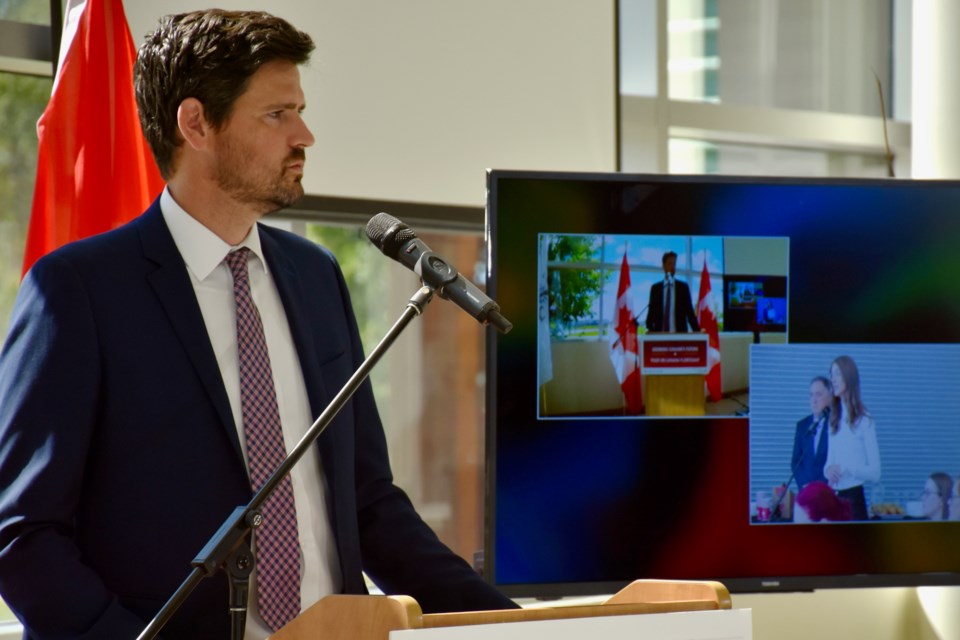A program attracting skilled immigrants to Northern Ontario will be around for a little longer.
The Rural and Northern Immigration Pilot (RNIP) has been extended to 2024 and the boundaries for seven of the 11 participating communities have been expanded. Minister of Immigration, Refugees and Citizenship Sean Fraser was at College Boreal in Timmins to announce the changes and hear from people involved in the program.
Other changes announced today include expanding the range of job offers available to candidates in the health care and trades sector, helping community partners provide greater support to candidates and employers, and reducing the amount of money participants are required to have.
Timmins is one of the communities seeing its boundaries extended. The area now covers the Highway 11 corridor from Hearst to the Cobalt area and west on Highway 101 to Foleyet.
The geographic boundaries are also expanding for North Bay, Sudbury, Thunder Bay, Moose Jaw, Sask., West Kootenay, BC, and Vernon, BC. Maps of the new boundaries are available here.
Locally, the Timmins Economic Development Corporation facilitates the RNIP program.
TEDC community development consultant Madison Mizzau said today's changes are fantastic.
"We’re very excited particularly about the boundary extension because that’s something that our regional communities had been advocating for,” she said.
During the first year of the program, Timmins received 63 applications. That increased to 129 applications in 2021, and so far in 2022, there have been 104 applications.
TEDC chair Audrey Penner said there have been 217 community recommendations issued since the start of the pilot, which she says has been extremely successful.
RNIP is based on the Atlantic Immigration Pilot that launched in March 2017 and was made a permanent program in March 2022.
There is already interest in Northern Ontario to have the RNIP as a permanent program as well.
“My hope when we had launched pilot programs is that we discovered a new way to meet the needs of a community and if the pilot’s a success, then, of course, we would seek to make it permanent,” said Fraser.
The key markers Fraser said the government looks for when making a program permanent is if it's working and can it be expanded or shifted to make sure the needs of local communities are met.
Because of the pandemic, he explained that they need to understand RNIP in a world where the borders are more open and it's easier for people to arrive.
Over the next couple of years, he said they'll see if the pilot is meeting the needs of the communities.
“My personal previous position is that this program has been a success and with certain minor changes along the way, and a potential expansion to other regions in Canada, it could potentially become a permanent source of newcomers to rural and northern communities,” he said.
In Timmins, Mizzau said early childhood educators are one of the top occupations that people are applying for.
"There are more and more trades applications coming in, we’re seeing transport truck drivers a lot lately as well. And we do see quite a bit from food service too from employers here,” she said.
The Bucket Shop in Timmins has seen successful in hiring newcomers.
Jamie Pouw said they've brought in six qualified workers from outside of Canada so far. Eight more people will be arriving in the coming months.
“We were very fortunate that they were able to immerse themselves immediately into our work environment. And we work hard as a company to embrace them and understand their cultural differences to make sure they felt welcomed,” he said.
While the Bucket Shop used an independent company to source the workers, he said RNIP has given a high Timmins a high profile.
"We’ve been able to benefit from the immigration strategies so successfully that we’re doing it again,” he said.
Even with the sourcing workers from outside of Canada, he said The Bucket Shop has a shortfall of about 20 welders right now.
For the mining sector overall, he said the shortfall is about 3,000 workers.
"When you look at the mining forecast for growth and if we scale our growth to the mining sector, we’ll have a shortage of 20, 40 and 60 people if we don’t address it immediately,” he said.
The Bucket Shop is also addressing the need for qualified people by providing training to Indigenous women in partnership with Keepers of the Circle.
The company is relying on immigration to get qualified people quickly, though.
“Immigration will have to be a standardized recruitment platform for every single company. The Canadian population simply isn’t big enough to accommodate the growth. We’re very fortunate in Northern Ontario that the mining sector, and hopefully the forestry sector, is poised for huge growth and that’s got a really positive light on Northern Ontario and the population can’t sustain it so immigration is not a bad thing at all, it’s a necessary requirement for any kind of growth,” he said.



